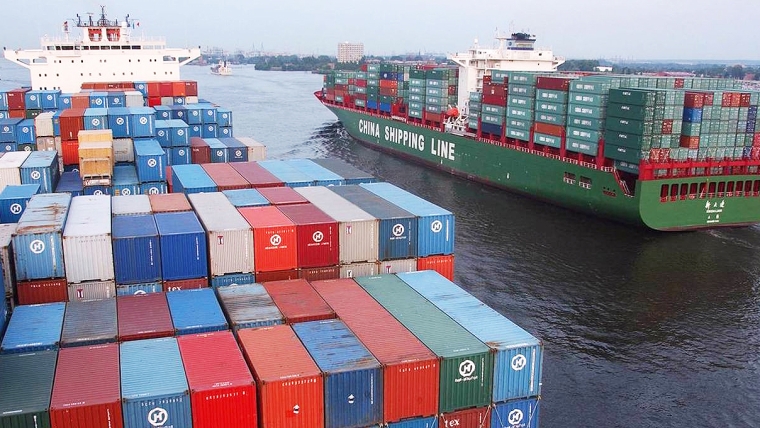
The global economy has entered a new age of national security. The COVID-19 pandemic highlighted the vulnerability caused by overreliance on global supply chains and the failure of coordination in tackling global health risks. But what has really ushered in this new era is Russia’s unprovoked invasion of Ukraine and sabotage of the global economy.
Beyond its human and economic toll, the war in Ukraine has sharply increased the divisions between the Western and Eastern geopolitical blocs centered around the United States and China, respectively. Russia has weaponized its energy and food exports to divide Europeans and has sought to stoke anti-Western sentiment in developing countries. China has sided with Russia and affirmed its support for the Kremlin’s security concerns. Tensions over Taiwan, a leading global semiconductor manufacturer, are another major flash point in US-China relations.
These developments should be seen as aftershocks of the world economy’s increasing polarization, underpinned by the asymmetry of the two superpowers’ political systems. It is no coincidence that several frozen conflicts have recently become active, and that many medium-size and regional powers are behaving more assertively.
Unlike the Soviet Union during the Cold War, China is both a strategic and an economic rival to the US. China’s growing trade and financial ties with the Global South help to explain the shift in many poorer countries’ allegiances vis-à-vis America. But the decision by many developing countries in March to abstain from voting on United Nations General Assembly resolutions condemning Russia’s invasion of Ukraine surprised US and European officials.
The growing geopolitical and economic split between the superpowers should prompt a paradigm shift in economic thinking. Economists have long regarded national security as a separate field of study with little relevance to their analysis of markets – and for good reason: their profession, like the global economy, has flourished amid the relative stability of the post-World War II era.
The Bretton Woods institutions and the World Trade Organization – with the West and specifically the US providing an implicit backstop – have helped support the global economy’s expansion. Since 1960, global GDP has increased about eightfold. And as a result of the Chinese economy’s formidable rise in recent decades, China’s GDP (measured at market exchange rates) could surpass that of the US by 2030.
But today’s geopolitical polarization risks fragmenting the global economy in multiple ways. There are strong indications that this is already happening. Former US President Donald Trump’s “America First” approach and instigation of a tariff war with China dealt a sharp blow to free markets and free trade, and Joe Biden’s administration has followed suit. US Treasury Secretary Janet Yellen recently advocated “friend-shoring” supply chains to trusted allies as part of America’s strategic response to the growing Chinese challenge. But deciding who counts as a “friend” may be difficult; using criteria such as a country’s commitment to democracy could result in a rather small group.
In parallel, a growing number of countries have shown interest in joining the BRICS, a group comprising Brazil, Russia, India, China, and South Africa. China is promoting a new global governance system supported by new organizations. And China and Russia are looking to develop alternatives to the SWIFT payment system. That, too, will not be easy, not least because payment systems are intertwined with issues related to reserve currencies. A litmus test for China is whether it can find an alternative to US Treasuries in which to invest its sizeable foreign-exchange reserves.
There have been many historical episodes of fragmentation, including trade wars, but perhaps none so pervasive between two economic and strategic superpowers. The trend is evident in stock-exchange delistings, sectors such as microchips and telecommunications technology, agricultural land sales, energy, and the defense industry. And the fragmentation of supply chains for both goods and services could increase further as a result of non-tariff barriers such as security, privacy, and phytosanitary standards or problems related to the interoperability of electronic and digital equipment.
The trade-offs between economic efficiency and national security are enormous. Deviating from globalized markets will no doubt reduce efficiency, stoke inflation, and leave hundreds of millions of people worse off. Economists should therefore rethink their approach to topics such as comparative advantage, market integration, and how to promote convergence.
In this new environment where security of supply has become paramount, the design of value chains will have to minimize the risk of weaponization. And while free markets define efficient pricing better than any other mechanism, fragments of the global economy will likely function independently with autonomous pricing and sourcing.
Tackling increasing economic fragmentation and curbing its costs will undoubtedly require economists to address the underlying sources of division. Building trust and limiting uncertainty between the two superpowers and their allies will thus be vital. But that will require something altogether different from fresh economic thinking.
Rabah Arezki, former chief economist and vice president at the African Development Bank and former chief economist of the World Bank’s Middle East and North Africa Region, is a senior fellow at Harvard Kennedy School. Copyright: Project Syndicate, 2022, and published here with permission.
9 Comments
From Australia today:
In 1970 475,000 cars were made in Australia, the 10th highest rate in the world, making Australia one of only 13 countries with the capabilities to design and develop mass market cars from scratch. Much the same applied for white goods, furniture, rolling stock, buses, tractors and shipbuilding, which on its own contributed $1.7 billion directly in value added to Australia’s Gross Domestic Product. We were also the third nation to put a local built satellite into orbit, built a pilotless aircraft, (Jindivik) and developed, by modifications, – one of the best fighter aircraft of that time (the Sabre) which was faster that the US version. All this happened when our population was 12.5 million and we didn’t need skilled immigration because we trained local people. But then economists instructed governments that they should rely on the markets.....
Yes short term thinking. They realized all they needed to do was mine resources to get rich.
The problem is we can't go back to the past we have to invent a new future which is sustainable and resilient
Build trust is the key and US foreign policy currently is only breaking trust and cooperation
So many lies in this article.
Economics should never be viewed separately from politics.
The Western development economics theory never teach students that it would never get so rich without slaughtering indigenous people and robbing their land.
Xing, there is a double negative in there (...never...never...) that makes it almost unintelligible. Can't the CCP provide an editing service?
With this kind of toxic drivel coming from Wumao it makes you wonder if the West shouldn't have bothered liberating them from the Imperial Japanese.
Here's Donald Trump blabbering about how unhappy he is with German/Russian economic ties (here)
Here's a rather sinister Joe Biden implying that the USA would sabotage Nord Stream 2 (here)
Here's Freddie Sayers interviewing economic historian Prof. Wolfgang Streeck about how disastrous the current conflict is for Germany and Europe. (here)
BRICS, to my untrained eyes, is a small version of the UN.
War, not trade, is increasingly used as a leverage by the mighty. Yes the powerful use trade and war as they see fit.
"Globalisation" like "supply chain disruptions" are the results, not the cause.

We welcome your comments below. If you are not already registered, please register to comment
Remember we welcome robust, respectful and insightful debate. We don't welcome abusive or defamatory comments and will de-register those repeatedly making such comments. Our current comment policy is here.